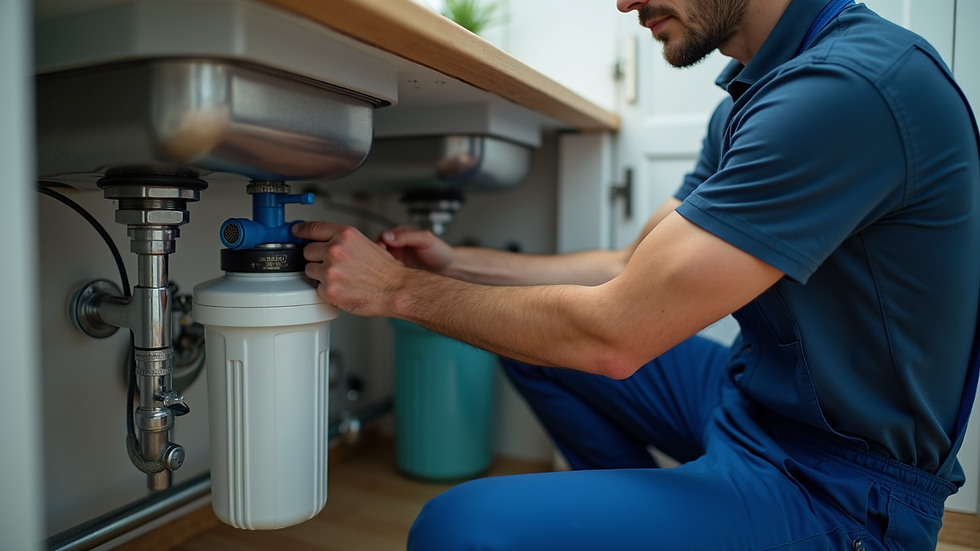A Guide to Installing Whole House Water Filters
- joshfisher8
- Oct 28, 2025
- 4 min read
Clean and safe water is essential for every home. Installing a whole house water filter ensures that every tap in your house delivers purified water. This guide will walk you through the process of installing whole house water filters, helping you understand the benefits, the steps involved, and what to expect in terms of cost and maintenance.
Understanding Whole House Water Filters
Whole house water filters are systems designed to filter all the water entering your home. Unlike point-of-use filters that only treat water at a single faucet, these filters provide clean water to every outlet, including showers, sinks, and appliances.
These systems typically remove contaminants such as chlorine, sediment, heavy metals, and sometimes bacteria or viruses, depending on the filter type. This improves water taste, protects plumbing, and enhances the lifespan of appliances.
Types of Whole House Water Filters
Sediment Filters: Remove dirt, sand, and rust particles.
Carbon Filters: Eliminate chlorine, bad odors, and improve taste.
Reverse Osmosis Systems: Provide advanced filtration for heavy contaminants.
UV Filters: Use ultraviolet light to kill bacteria and viruses.
Choosing the right filter depends on your water quality and specific needs.

How to Choose the Right Whole House Water Filters for Your Home
Selecting the right whole house water filter starts with testing your water. You can use a home testing kit or hire a professional to analyze your water for contaminants. Knowing what impurities are present will guide you in choosing the appropriate filtration system.
Consider the following factors:
Water Quality: Identify contaminants to target.
Flow Rate: Ensure the filter can handle your household water demand.
Filter Capacity: Check how much water the filter can treat before replacement.
Maintenance Requirements: Understand how often filters need changing.
Budget: Balance cost with features and durability.
For example, if your water has high sediment levels, a sediment filter is essential. If chlorine taste is a problem, a carbon filter will help. Some homes may require a combination of filters for comprehensive treatment.

How much does it cost to install a whole house filtration system?
The cost of installing a whole house water filtration system varies widely based on the type of filter, the complexity of installation, and your location. On average, you can expect:
Basic sediment or carbon filters: $400 to $1,000 for equipment and installation.
Advanced systems (reverse osmosis or UV): $1,000 to $3,000 or more.
Professional installation: $200 to $500 depending on plumbing complexity.
DIY installation can save money but requires plumbing knowledge and tools. Hiring a licensed plumber ensures proper setup and compliance with local codes.
Additional costs may include:
Replacement filters every 6 to 12 months.
Water testing before and after installation.
Possible plumbing upgrades if your pipes are old or incompatible.
Budgeting for these expenses will help you maintain your system effectively.

Step-by-Step Guide to Installing Whole House Water Filters
Installing a whole house water filter involves several key steps. If you are comfortable with plumbing, you can attempt this yourself; otherwise, hiring a professional is recommended.
1. Turn Off the Main Water Supply
Before starting, shut off the main water valve to prevent leaks and water damage.
2. Choose the Installation Location
The filter should be installed where the main water line enters your home, typically in the basement, garage, or utility room. Ensure there is enough space for the filter and easy access for maintenance.
3. Cut the Main Water Line
Use a pipe cutter to carefully cut the main water line where the filter will be installed.
4. Install the Filter Housing
Attach the filter housing to the water line using appropriate fittings. Use Teflon tape on threaded connections to prevent leaks.
5. Insert the Filter Cartridge
Place the correct filter cartridge inside the housing according to the manufacturer’s instructions.
6. Secure the System and Turn On Water
Tighten all connections, open the main water valve slowly, and check for leaks. Flush the system as recommended to remove any air or loose carbon particles.
7. Monitor and Maintain
Regularly check the filter pressure and replace cartridges as needed to ensure optimal performance.
For those interested in professional help, consider contacting experts specializing in whole house water filtration installation to ensure a smooth and reliable setup.
Maintaining Your Whole House Water Filter System
Proper maintenance is crucial for the longevity and effectiveness of your water filter. Here are some tips:
Replace Filters Regularly: Follow the manufacturer’s schedule, usually every 6 to 12 months.
Inspect for Leaks: Check connections and housing for any signs of water leakage.
Clean the System: Some filters require periodic cleaning to remove sediment buildup.
Monitor Water Quality: Test your water periodically to ensure the filter is working correctly.
Keep Records: Maintain a log of filter changes and maintenance activities.
Neglecting maintenance can lead to reduced water quality and damage to your plumbing system.
Benefits of Installing Whole House Water Filters
Investing in a whole house water filter offers numerous advantages:
Improved Water Taste and Odor: Removes chlorine and other chemicals.
Healthier Water: Reduces contaminants that can affect health.
Protects Plumbing and Appliances: Prevents sediment buildup and corrosion.
Convenience: Clean water from every tap without individual filters.
Cost Savings: Extends the life of water-using appliances and reduces bottled water expenses.
These benefits make whole house water filters a smart choice for any household.

Final Thoughts on Whole House Water Filters
Installing a whole house water filter is a practical way to ensure clean, safe water throughout your home. By understanding your water quality, choosing the right system, and following proper installation and maintenance steps, you can enjoy the benefits of purified water every day.
Whether you decide to install the system yourself or hire a professional, investing in whole house water filtration is a step toward better health and home protection. For expert assistance, consider reaching out to professionals who specialize in whole house water filtration installation to get started on your clean water journey.




Comments